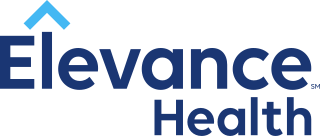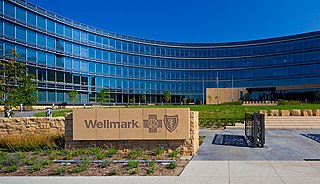
In the United States, Medicaid is a government program that provides health insurance for adults and children with limited income and resources. The program is partially funded and primarily managed by state governments, which also have wide latitude in determining eligibility and benefits, but the federal government sets baseline standards for state Medicaid programs and provides a significant portion of their funding.

Medicare is a federal health insurance program in the United States for people age 65 or older and younger people with disabilities, including those with end stage renal disease and amyotrophic lateral sclerosis. It was begun in 1965 under the Social Security Administration and is now administered by the Centers for Medicare and Medicaid Services (CMS).

The Centers for Medicare & Medicaid Services (CMS) is a federal agency within the United States Department of Health and Human Services (HHS) that administers the Medicare program and works in partnership with state governments to administer Medicaid, the Children's Health Insurance Program (CHIP), and health insurance portability standards. In addition to these programs, CMS has other responsibilities, including the administrative simplification standards from the Health Insurance Portability and Accountability Act of 1996 (HIPAA), quality standards in long-term care facilities through its survey and certification process, clinical laboratory quality standards under the Clinical Laboratory Improvement Amendments, and oversight of HealthCare.gov. CMS was previously known as the Health Care Financing Administration (HCFA) until 2001.
The term managed care or managed healthcare is used in the United States to describe a group of activities intended to reduce the cost of providing health care and providing American health insurance while improving the quality of that care. It has become the predominant system of delivering and receiving American health care since its implementation in the early 1980s, and has been largely unaffected by the Affordable Care Act of 2010.
...intended to reduce unnecessary health care costs through a variety of mechanisms, including: economic incentives for physicians and patients to select less costly forms of care; programs for reviewing the medical necessity of specific services; increased beneficiary cost sharing; controls on inpatient admissions and lengths of stay; the establishment of cost-sharing incentives for outpatient surgery; selective contracting with health care providers; and the intensive management of high-cost health care cases. The programs may be provided in a variety of settings, such as Health Maintenance Organizations and Preferred Provider Organizations.

Blue Cross Blue Shield Association, also known as BCBS, BCBSA, or The Blues, is a United States-based federation with 34 independent and locally-operated BCBSA companies that provide health insurance in the United States to more than 115 million people as of 2022.
Health care prices in the United States of America describe market and non-market factors that determine pricing, along with possible causes as to why prices are higher than in other countries.

The Massachusetts health care reform, commonly referred to as Romneycare, was a healthcare reform law passed in 2006 and signed into law by Governor Mitt Romney with the aim of providing health insurance to nearly all of the residents of the Commonwealth of Massachusetts.
In the United States, health insurance helps pay for medical expenses through privately purchased insurance, social insurance, or a social welfare program funded by the government. Synonyms for this usage include "health coverage", "health care coverage", and "health benefits". In a more technical sense, the term "health insurance" is used to describe any form of insurance providing protection against the costs of medical services. This usage includes both private insurance programs and social insurance programs such as Medicare, which pools resources and spreads the financial risk associated with major medical expenses across the entire population to protect everyone, as well as social welfare programs like Medicaid and the Children's Health Insurance Program, which both provide assistance to people who cannot afford health coverage.
Medicare Advantage is a type of health plan offered by Medicare-approved private companies that must follow rules set by Medicare. Most Medicare Advantage Plans include drug coverage. Under Part C, Medicare pays a sponsor a fixed payment. The sponsor then pays for the health care expenses of enrollees. Sponsors are allowed to vary the benefits from those provided by Medicare's Parts A and B as long as they provide the actuarial equivalent of those programs. The sponsors vary from primarily integrated health delivery systems to unions to other types of non profit charities to insurance companies. The largest sponsor is a hybrid: the non profit charity AARP using UnitedHealth.
Healthcare reform in the United States has a long history. Reforms have often been proposed but have rarely been accomplished. In 2010, landmark reform was passed through two federal statutes: the Patient Protection and Affordable Care Act (PPACA), signed March 23, 2010, and the Health Care and Education Reconciliation Act of 2010, which amended the PPACA and became law on March 30, 2010.

In the United States, health insurance coverage is provided by several public and private sources. During 2019, the U.S. population overall was approximately 330 million, with 59 million people 65 years of age and over covered by the federal Medicare program. The 273 million non-institutionalized persons under age 65 either obtained their coverage from employer-based or non-employer based sources, or were uninsured. During the year 2019, 89% of the non-institutionalized population had health insurance coverage. Separately, approximately 12 million military personnel received coverage through the Veteran's Administration and Military Health System.
There were a number of different health care reforms proposed during the Obama administration. Key reforms address cost and coverage and include obesity, prevention and treatment of chronic conditions, defensive medicine or tort reform, incentives that reward more care instead of better care, redundant payment systems, tax policy, rationing, a shortage of doctors and nurses, intervention vs. hospice, fraud, and use of imaging technology, among others.

The Affordable Care Act (ACA), formally known as the Patient Protection and Affordable Care Act (PPACA) and colloquially as Obamacare, is a landmark U.S. federal statute enacted by the 111th United States Congress and signed into law by President Barack Obama on March 23, 2010. Together with the Health Care and Education Reconciliation Act of 2010 amendment, it represents the U.S. healthcare system's most significant regulatory overhaul and expansion of coverage since the enactment of Medicare and Medicaid in 1965.
Blue Cross Blue Shield of Michigan (BCBSM) is an independent licensee of Blue Cross Blue Shield Association.

Elevance Health, Inc. is an American health insurance provider. Prior to June 2022, Elevance Health was named Anthem, Inc. The company's services include medical, pharmaceutical, dental, behavioral health, long-term care, and disability plans through affiliated companies such as Anthem Blue Cross and Blue Shield, Anthem Blue Cross in California, Wellpoint, and Carelon. It is the largest for-profit managed health care company in the Blue Cross Blue Shield Association. As of 2022, the company had 46.8 million members within its affiliated companies' health plans.
Health care finance in the United States discusses how Americans obtain and pay for their healthcare, and why U.S. healthcare costs are the highest in the world based on various measures.
The Affordable Care Act (ACA) is divided into 10 titles and contains provisions that became effective immediately, 90 days after enactment, and six months after enactment, as well as provisions phased in through to 2020. Below are some of the key provisions of the ACA. For simplicity, the amendments in the Health Care and Education Reconciliation Act of 2010 are integrated into this timeline.

Wellmark Blue Cross Blue Shield is a mutual insurance in the United States with more than two million members in Iowa and South Dakota. It is the dominant health insurance in Iowa. It is an independent licensee of the Blue Cross Blue Shield Association. Founded in 1939, Wellmark offers dental and health insurance as well as life insurance. It began participating in the health care exchange for 2017.
The Patient Protection and Affordable Care Act, often shortened to the Affordable Care Act (ACA) or nicknamed Obamacare, is a United States federal statute enacted by the 111th United States Congress and signed into law by President Barack Obama on March 23, 2010. Together with the Health Care and Education Reconciliation Act of 2010 amendment, it represents the U.S. healthcare system's most significant regulatory overhaul and expansion of coverage since the passage of Medicare and Medicaid in 1965. Once the law was signed, provisions began taking effect, in a process that continued for years. Some provisions never took effect, while others were deferred for various periods.
Patrick H. Conway is an American physician and an advocate of health system transformation and innovation in the public and private sector. He is a practicing pediatrician formerly serving at the Cincinnati Children's Hospital and Children's National Medical Center. He was the chief medical officer and acting administrator at the Centers for Medicare and Medicaid Services (CMS) leading quality-of-care efforts for the nation. Conway also served as the Director of the Center for Medicare and Medicaid Innovation, and was responsible for new national payment models for Medicare and Medicaid focused on better quality and lower costs.






